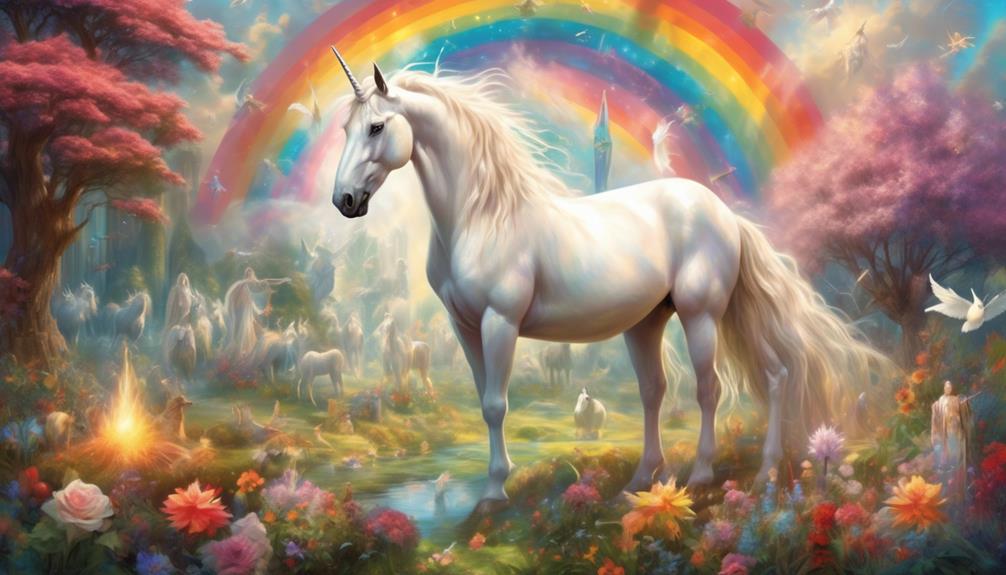Unicorns in the Bible have sparked debate and curiosity for centuries, prompting scholars to question their existence and significance. While some dismiss them as mythical creatures, others argue that they hold a deeper, symbolic meaning.
The mere mention of unicorns in the scriptures invites a closer examination of their role and relevance, leaving many to ponder the truth behind their presence.
Key Takeaways
- Unicorns appear in the Bible a total of 9 times, specifically in the books of Numbers, Isaiah, Job, Deuteronomy, and Psalms.
- The use of the word "unicorn" in the Bible is open to interpretation and translation, and other versions often substitute another word to avoid confusion.
- The presence of unicorns in the Bible may be symbolic rather than representing real creatures, similar to other mythical creatures mentioned in the Bible.
- The symbolism and meaning of unicorns in the Bible suggest strength and power, and they are associated with being feared and respected, demonstrating God's strength.
Biblical References to Unicorns
The unicorn appears in the Bible a total of 9 times, specifically in the books of Numbers, Isaiah, Job, Deuteronomy, and Psalms in the Authorized King James Version.
These references to unicorns are of historical significance, as they depict unicorns as mythical creatures.
In the Bible, unicorns aren't portrayed as gentle or docile animals, but rather as powerful and fearsome beings.
The use of the word 'unicorn' in the Bible is open to interpretation, and it's important to approach these references with an understanding of their symbolic and historical context.
The appearance of unicorns in the Bible may not necessarily imply the existence of such creatures, but rather serve as a means of conveying strength and power.
It's essential to consider the broader symbolism and historical context when interpreting these references for a well-rounded understanding.
Interpretation of Unicorns in the Bible
Interpreting unicorns in the Bible raises questions about their symbolic significance and historical context. The presence of unicorns in the Bible prompts consideration of their possible symbolic representation rather than their existence as real creatures. These mythical creatures, along with dragons, are mentioned in the Bible, and their appearance may hold different meanings depending on the context.
Modern translations of the Bible may exclude references to unicorns to maintain accuracy. The term 'unicorn' historically referred to single-horned rhinos, but its meaning may have evolved over time due to shifting semantics. The translation of the Hebrew word 'reem' as 'unicorn' in the Bible may not be entirely accurate, adding to the uncertainty surrounding their interpretation.
Unicorns in the Bible are often associated with strength and power, emphasizing their significance in biblical contexts.
Symbolism and Meaning of Unicorns in the Bible
The historical evolution of the term 'unicorn' from its association with single-horned rhinos to its symbolic representation in the Bible underscores the shifting semantics and adds to the uncertainty surrounding the accurate interpretation of unicorns in biblical contexts.
The term 'unicorn' historically referred to single-horned rhinos, and its translation in the Bible is open to interpretation. Comparing unicorn symbolism in different religious texts reveals varying interpretations.
Unicorns in the Bible may not represent real creatures but serve as symbolic references, symbolizing strength and power. The uncertainty and lost translation of unicorns in the Bible have led to ambiguity about the true identity of the animal mentioned.
The unicorn in the Bible is associated with strength, power, and danger, representing a creature to be feared and respected, demonstrating God's strength.
Uncertainty and Lost Translation of Unicorns in the Bible
Amidst the historical evolution and linguistic nuances, the uncertainty surrounding the accurate interpretation of unicorns in biblical contexts adds layers of complexity to their portrayal in the Bible.
The Greek translation of the Hebrew word 'reem' caused confusion and led to the word 'unicorn.'
The original meaning of the word 'reem' may have referred to a wild one-horned ox, but over time and language differences, the true identity of the animal mentioned as a unicorn in the Bible became unclear.
The context of the Bible passages suggests a horned animal, but the specific creature is unknown.
This uncertainty has led to alternative interpretations of unicorn symbolism, as the unicorn in the Bible may be a case of lost translation or interpretation.
Strength and Power of the Unicorn in the Bible
The strength and power of the unicorn in the Bible are exemplified through its descriptions as having the ability to eat up nations and break bones. Biblical depictions of unicorn strength emphasize their association with power and danger, often mentioned alongside lions to symbolize equal threat and power.
Unicorns in the Bible represent a creature to be feared and respected, demonstrating God's strength. Their role as divine symbols in the Bible is one of power and might, showcasing the majestic and formidable aspects of God's creation.
These depictions serve as a reminder of the awe-inspiring nature of the divine and the need for reverence and caution in its presence.
Frequently Asked Questions
What Is the Origin of the Belief in Unicorns and How Did They Come to Be Associated With the Bible?
The origin of the belief in unicorns and their association with the Bible is shrouded in historical and linguistic complexity. Their biblical symbolism raises questions about their existence and meaning, challenging traditional interpretations.
Are There Any Archaeological or Historical Evidence Supporting the Existence of Unicorns in Biblical Times?
Archaeological findings and historical records do not confirm the existence of unicorns in biblical times. Biblical references to unicorns are open to interpretation, and the true identity of the creature mentioned remains uncertain.
How Do Other Religious Texts or Cultures Interpret the Concept of Unicorns, and How Does It Compare to the Biblical Interpretation?
Other religious texts or cultures' interpretations of unicorns compared to the biblical interpretation involve symbolism and cultural significance. The comparison provides insights into the unicorn's representation, shedding light on its meaning across different traditions.
Have There Been Any Modern Discoveries or Scientific Research That Shed Light on the True Identity of the Creature Referred to as a Unicorn in the Bible?
Modern sightings and DNA analysis haven't definitively identified the biblical unicorn. Fossil evidence and cultural interpretations offer diverse views. Symbolism in mythology and artistic depictions contribute to the enigmatic identity of this creature.
How Have Artistic Representations and Popular Culture Influenced the Modern Perception of Unicorns in Relation to Their Biblical Symbolism?
Artistic influence and popular culture have shaped modern representation and cultural perception of unicorns, impacting their biblical symbolism and origin. These influences often portray unicorns as magical and mystical creatures, altering their original significance.

